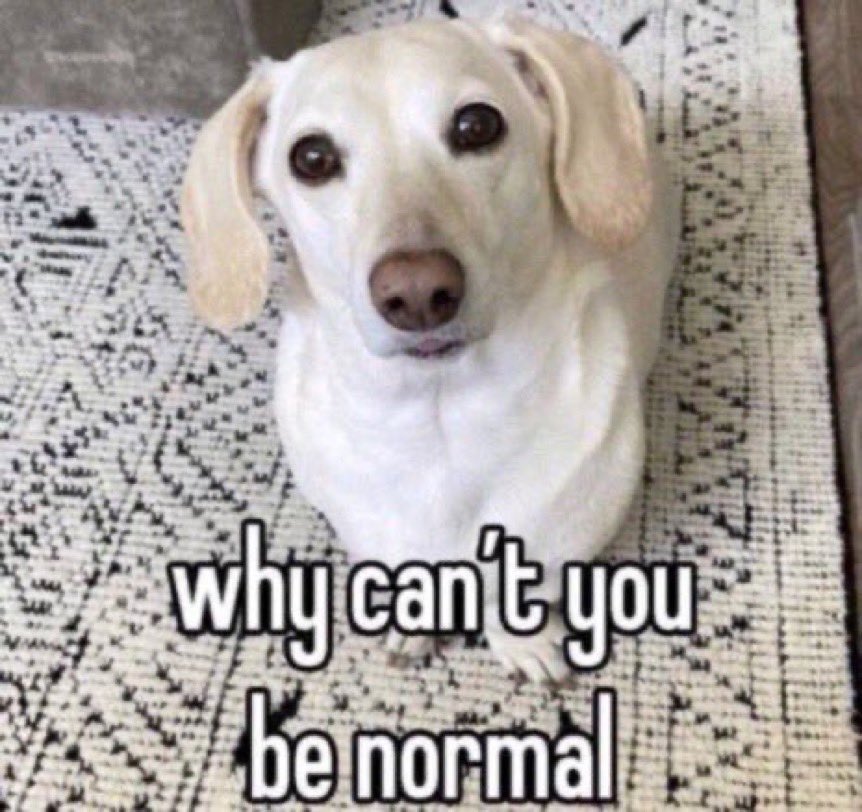The Homophobic Dog Meme: Unpacking Internet Irony And Viral Sensations
Unpacking the "Homophobic Dog" Meme: What Exactly Is It?
At its core, the "homophobic dog meme" refers to a series of ironic image macros featuring a charming white miniature dachshund named Whitney Chewston. These images typically depict Whitney sitting stoically, often beside a glass of red wine, accompanied by a whisper caption that reads, "not too fond of gay people." The humor, and indeed the entire premise, lies in the stark irony of the statement. A dog, by its very nature, cannot hold prejudices or have complex social biases like homophobia. The meme's creators leverage this absurdity to create a comedic effect, presenting Whitney's seemingly judgmental expression as if she were capable of such human-like disdain. While most commonly known as the "homophobic dog" or "not too fond of gay people" meme, its essence remains consistent: it’s a visual gag playing on the incongruity of a pet harboring human-like, albeit negative, opinions. It’s a classic example of anthropomorphism in internet humor, where human characteristics are attributed to animals for comedic or satirical purposes. The meme's popularity underscores the internet's unique ability to transform simple images into widely understood cultural touchstones, even when they carry a provocative, ironic label.The Star of the Show: Who is Whitney Chewston?
Behind every great meme, there's often an unassuming star. In the case of the "homophobic dog meme," that star is Whitney Chewston, a miniature dachshund whose distinctive look and seemingly perpetual "judgmental" expression launched her into internet stardom. Her presence is what makes the meme so visually compelling and instantly recognizable.A Brief Biography of Whitney Chewston
Born on September 8, 2016, Whitney Chewston is a miniature dachshund who, like many pets, probably lived a relatively normal life until 2021. That year, she became the unexpected subject of an internet meme that would skyrocket her to viral fame. Her owners, whose identities are not widely publicized in connection with the meme's origin, captured the images that would eventually be paired with the now-famous, ironic caption. It's Whitney's unique posture, her slightly narrowed eyes, and the way she seems to be observing the world with a discerning, almost critical gaze that made her the perfect canvas for this particular brand of humor. She embodies the "judgemental" look that meme creators found so ripe for ironic commentary.Whitney Chewston's "Personal Data"
For a canine celebrity, Whitney Chewston has certainly accumulated a significant following. Her dedicated Instagram page boasts over 170,000 followers as of February 2025, a testament to her enduring appeal beyond just the meme itself. | Attribute | Detail | | :------------------ | :---------------------------------------------------------------------- | | **Name** | Whitney Chewston | | **Also Known As** | The Homophobic Dog, Not Too Fond of Gay People Dog | | **Breed** | Miniature Dachshund | | **Birth Date** | September 8, 2016 | | **Known For** | Viral Internet Meme (since 2021), Judgmental Expression | | **Instagram Page** | Yes | | **Instagram Followers** | Over 170,000 (as of February 2025) |The Genesis of a Viral Sensation: How the Meme Began
The journey of the "homophobic dog meme" from a simple photo to a global internet phenomenon is a classic tale of online virality. According to Know Your Meme, the authoritative source for tracking internet trends, the first viral photo of Whitney that truly took off was posted with a caption that suggested her judging gaze. This initial spark quickly caught fire, as users across various social media platforms found her expression universally relatable, or at least highly amusing. The internet's meme-generating ecosystem then took over. People started to pair Whitney's iconic image with various ironic or absurd captions, but the "not too fond of gay people" iteration proved to be the most sticky. Its provocative nature, combined with the undeniable cuteness and seemingly serious demeanor of Whitney, created a perfect storm for virality. The meme's rapid spread highlights how easily images can be repurposed and recontextualized in the digital age, often evolving far beyond their original intent. The accessibility of online meme generators also played a crucial role, allowing anyone to quickly create and share their own versions, further cementing Whitney Chewston's status as an internet icon.The Ironic Heart of the "Homophobic Dog" Meme
The true genius and, simultaneously, the potential point of contention for the "homophobic dog meme" lies squarely in its irony. Understanding this irony is paramount to grasping why it became so popular and why it is generally considered harmless by its creators and most users. The core of the joke is the absurd notion that a dog could possess such a complex human prejudice. Dogs are beloved for their unconditional love and lack of judgment; attributing homophobia to one is inherently nonsensical and therefore, to many, humorous. This meme is primarily used as an "ironic reaction image to show joking disagreement towards LGBTQ+ topics or people." It’s not meant to express genuine animosity but rather a hyperbolic, over-the-top, and clearly false "disagreement." Think of it like the "This is fine" meme, where a cartoon dog calmly sips coffee in a burning room. The phrase "this is fine" is ironic because, clearly, things are *not* fine. Similarly, Whitney Chewston is *not* homophobic. The humor derives from the deliberate mismatch between the image's "serious" appearance and the ludicrous claim made about the dog. It's a form of dark humor or absurdist comedy, often employed to lighten a mood or make a point about how ridiculous certain real-world prejudices are by projecting them onto an innocent animal. The irony serves as a shield, allowing users to engage with a sensitive topic in a way that, for many, avoids actual offense by clearly signaling that the statement is not meant literally.Navigating Sensitivity: The "Homophobic Dog" and its Controversies
While the "homophobic dog meme" is rooted in irony, its very name and caption touch upon a deeply sensitive and serious issue: homophobia. This intersection of lighthearted internet humor with a significant social concern inevitably leads to discussions about appropriateness, intent, and impact. It’s crucial to approach this meme with a clear understanding of what homophobia truly is, and how its ironic use in a meme differs from its real-world manifestation.Understanding Homophobia: A Crucial Distinction
To truly understand the context surrounding the "homophobic dog meme," one must first grasp the serious nature of homophobia itself. Homophobia is far from a joke; it encompasses a wide "range of negative attitudes and feelings toward homosexuality or people who identify or are perceived as being lesbian, gay or bisexual." It is characterized by "prejudice, hate, fear, and misunderstanding" directed at the LGBTQ+ community. This can manifest as "discrimination against, aversion to, or fear of homosexuality or gay people." It’s often rooted in "irrational fear" and can take many forms, from subtle biases to overt acts of violence. Furthermore, homophobia is often intertwined with heterosexism, which describes a societal assumption that everyone is, or should be, heterosexual. This can result in "serious forms of prejudice against those who experience same-sex attraction." The negative, regressive, and discriminatory attitudes and practices associated with homophobia have been a pervasive phenomenon throughout history, causing immense harm and suffering to individuals and communities. The key takeaway here is that genuine homophobia is a real, harmful social issue that leads to prejudice and discrimination. The meme, by contrast, uses the term purely for ironic effect, knowing that a dog cannot genuinely hold such beliefs.The Fine Line: When Irony Can Be Misunderstood
Despite the clear ironic intent behind the "homophobic dog meme," the use of such a loaded term can understandably cause discomfort or offense for some. The internet is a vast and diverse place, and not everyone is privy to the nuances of internet irony or the specific context of every meme. What one person perceives as harmless humor, another might see as trivializing a serious issue or, worse, inadvertently normalizing harmful language. The potential for misunderstanding is real. For individuals who have experienced discrimination or prejudice due to their sexual orientation, even an ironic use of "homophobic" can be jarring or painful. This is why discussions around the meme sometimes arise, with some platforms, like Reddit, even having rules or bans against the use of certain terms that could be construed as hate speech, regardless of intent. The phrase "Homophobic dog, you know that word is banned in reddit, right?" highlights this sensitivity. It underscores the importance of context and audience awareness when engaging with humor that borders on sensitive topics. While the meme's creators and most users understand the irony, the broader impact of such language on those who might misinterpret it, or who simply find the juxtaposition distasteful, is a valid consideration in the complex landscape of online communication.The Broader Impact: Beyond Just a Dog Meme
The "homophobic dog meme" is more than just a fleeting internet joke; it's a microcosm of how modern digital culture operates. It exemplifies several broader trends in online communication and humor. Firstly, it showcases the power of anthropomorphism in memes. We love to project human traits, emotions, and even complex opinions onto animals, often for comedic effect. Whitney Chewston's "judgmental" look is a perfect canvas for this, allowing us to playfully imagine what our pets might be thinking if they could truly judge our life choices. Secondly, the meme highlights the pervasive influence of social media in shaping cultural narratives and disseminating humor. A simple image can gain millions of impressions, sparking discussions and becoming a shared reference point within a matter of days. Whitney's impressive Instagram following further illustrates how a meme can transcend its initial format and create a dedicated community around the subject. Lastly, it subtly touches upon the unexpected personalities of pets. While a Forbes Advisor study found that nearly three in ten (29%) dog owners in the UK regret their decision, often due to unforeseen challenges, the "homophobic dog meme" reminds us that pets, like Whitney, can also surprise us with their unique quirks and expressions, some of which are so distinct they become globally recognized. It's a testament to the unexpected ways our daily lives can intersect with viral fame.Creating Your Own: The Meme Generator and Digital Creativity
Part of what fuels the rapid spread and adaptability of memes like the "homophobic dog" is the widespread availability of online tools designed for their creation. What is a meme generator? Simply put, "It's a free online image maker that lets you add custom resizable text, images, and much more to templates." These user-friendly platforms democratize content creation, allowing anyone with an internet connection to become a meme artist. "People often use the generator to customize" existing meme templates or create entirely new ones. This accessibility means that once an image like Whitney Chewston's goes viral, countless individuals can put their own spin on it, adding new captions, altering existing ones, or combining it with other popular memes. This collaborative and iterative process is central to meme culture. It ensures that popular images remain fresh and relevant, adapting to new contexts and current events, and it certainly contributed to the longevity and widespread recognition of the "homophobic dog meme." It's a testament to how digital tools empower collective creativity and contribute to the ever-evolving lexicon of internet humor.The Longevity of a Viral Sensation: Why Whitney Chewston Endures
Many memes flash across our screens and disappear just as quickly. So, what is it about the "homophobic dog meme" that has given Whitney Chewston such staying power? Several factors contribute to its enduring appeal. Firstly, the core visual is inherently strong: a cute dog with a clearly discernible, almost human-like expression. Whitney's "judgmental" look is universally relatable, tapping into the shared experience of feeling judged or being amused by the idea of a pet's silent disapproval. Secondly, the meme's primary mechanism—irony—is a sophisticated form of humor that resonates deeply with internet-savvy audiences. The knowing wink behind the "not too fond of gay people" caption ensures that it appeals to those who appreciate layered jokes and understand the subversion of expectations. It's a meme that requires a certain level of digital literacy to fully appreciate, which can foster a sense of shared understanding among its users. Finally, its adaptability plays a crucial role. While the core caption remains iconic, the image of Whitney Chewston can be, and has been, repurposed for countless other ironic or observational jokes. This versatility allows the meme to remain relevant in various contexts, ensuring that Whitney continues to pop up on social media feeds, reminding us of her unique blend of cuteness, judgment, and undeniable internet fame.Conclusion
The "homophobic dog meme," starring the miniature dachshund Whitney Chewston, stands as a fascinating case study in the dynamics of internet culture. From her origins as a simple pet photo in 2021 to becoming a global viral sensation with over 170,000 Instagram followers, Whitney has solidified her place in the pantheon of internet icons. The meme's humor lies squarely in its profound irony, playfully attributing a complex human prejudice like homophobia to an innocent animal, thereby highlighting the absurdity of such a concept. However, as we've explored, the use of sensitive terminology, even ironically, necessitates a nuanced understanding of context and impact. While the meme's creators and most users clearly intend no harm and understand the ironic subversion, it serves as a powerful reminder of the fine line between humor and potential offense in the digital age. It underscores the importance of media literacy and critical thinking when navigating online content, urging us to distinguish between genuine prejudice and satirical commentary. Ultimately, the "homophobic dog meme" is a testament to the internet's boundless creativity, its capacity for layered humor, and its ongoing role in shaping our shared cultural landscape. What are your thoughts on the "homophobic dog meme" and its place in internet culture? Do you find its irony amusing, or do you believe such humor treads too close to sensitive territory? Share your perspective in the comments below, and feel free to explore other fascinating internet phenomena discussed on our site!
hera 🏳️🌈🍂 on Twitter: "homophobic dog meme collection (yes it’s

reactions on Twitter: "homophobic dog why can’t you be normal https://t

meepy on Twitter: "nico could never…